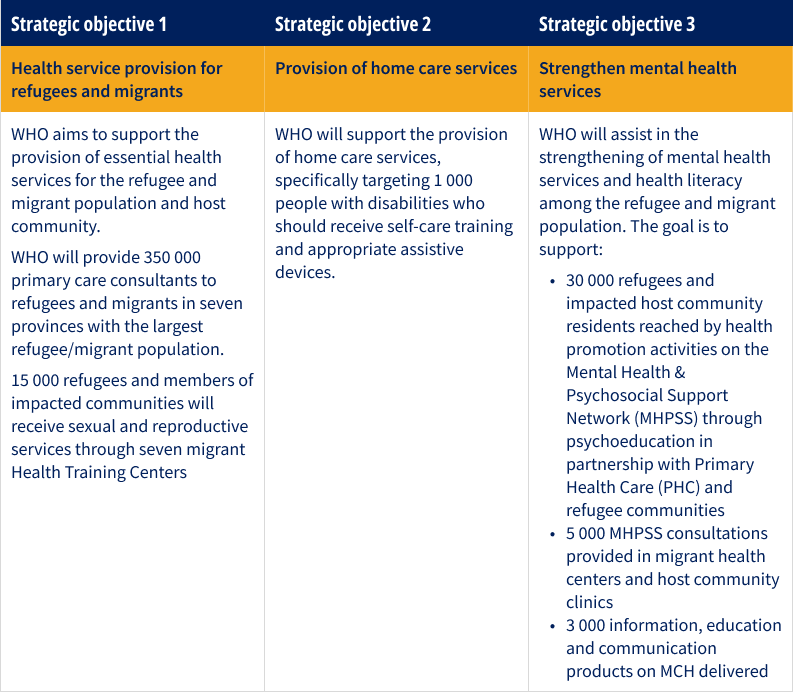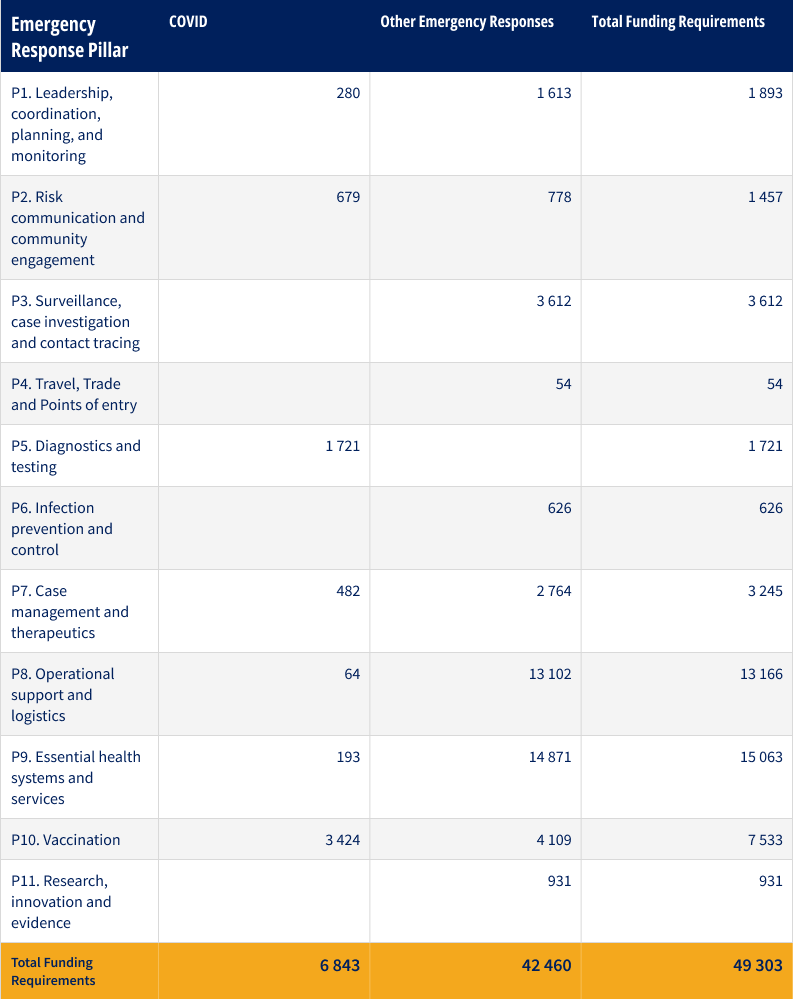
Türkiye
Türkiye
- People in need: 4.5 million1
- People targeted: 0.89 million2
- Requirements (US$): 49.3 million
Türkiye is currently hosting the largest refugee population in the world, with at least 4.2 million refugees and migrants as well as 300 000 asylum seekers (as of October 2022). These communities are predominantly from Syria, followed by Iraq, Iran and Afghanistan. This situation has intensified due to the geo-political context and the strategic position of Türkiye.
Foreigner nationals who are not registered with the Government of Türkiye have limited access to primary or referral health care but are provided with emergency care and essential public health, before being referred for registration. The registration and invalidation of health insurance coverage after one year has resulted in limited access to essential health services for refugees and migrants.
The unmet health needs of the refugee and migrant population continue to be exacerbated by the impact of the COVID-19 pandemic, resulting in a decrease in access to health services, particularly maternal and new-born health (including vaccination), non-communicable disease and mental health, disability and rehabilitation services and health information. WHO Türkiye is supporting the Turkish Ministry of Health to provide these essential health services, to both the refugee and host populations, through support for community health, primary health care, non-communicable diseases and mental health, communicable diseases (including COVID-19) and health system strengthening. Improving health literacy and mental health literacy for refugees and migrants is a core priority.

Syrian law student Muhammed, paralyzed by a stray bullet, takes first steps towards a brighter future in Türkiye.
Emergency response
The increasing and unmet physical, mental health and psychosocial needs of refugees and migrants exceed existing support and treatment capacities, which have been exacerbated by the impact of the COVID-19 pandemic and recent economic challenges.
The COVID-19 pandemic has placed a significant burden on health services and service users and resulted in lower utilization of basic health services and increased unmet health needs for the most vulnerable groups (including women, children, the elderly and the disabled).
WHO Türkiye will support the Ministry of Health (MoH) to build health system resilience through skills development and information and standards-sharing while supporting and augmenting primary and referral health care capacities. The entry point for these interventions is the MoH Migrant Health Centers (MHC) system and targeted specialized services. Health services will be designed to assure continuity of care so vulnerable communities can access appropriate curative services and secondary and tertiary prevention.
Preventative measures against health risks will address issues through health education, health promotion and health literacy in several languages, to enhance knowledge on health rights, on non-communicable and communicable disease prevention including COVID-19 and how to access health services. The sector will continue to work with the MoH to increase immunization coverage for all vulnerable children.
Specific programming to increase knowledge on prevention, along with improved curative and rehabilitative service availability will reduce the acuteness of disease and lessen the burden on referral care services.
WHO and its partners will continue to support mental health and psychosocial health services, expanding to meet needs at all levels of the health care system, including health literacy, substance abuse, mental health, patient satisfaction, monitoring and evaluation of service provision.
Strategic objectives


Key activities
- Support service provision in seven Migrant Health Centers.
- Support home care in seven provinces. Strengthen capacity for health professionals.
- Health literacy training and activities for both refugee/ migrant and host communities.
- Focus on health service providers and service users with targeted support for the most vulnerable groups under temporary and international protection.
- Support prevention, mitigation and response to COVID-19, supporting MoH efforts to curb the pandemic and advocating for more resources and information on cases and contacts among vulnerable groups.
- Provide support for online training and service provision, purchase of Personal Protective Equipment (PPE) and medical equipment/ supplies as needed.
Funding requirements
Overall country funding requirements, including COVID-19, by pillar (US$’000)


Success stories
Providing medical treatment for paralysis
28-year-old Muhammed was a law school sophomore in Aleppo, Syria. One day, he was shot in the back by a stray bullet, which damaged his spine and left him paralyzed. However, with the help of WHO’s Türkiye’s Refugee Health Programme, Muhammed was able to access much-needed medical treatment for his paralysis at the Refugee Health Training Centre (RHTC) in Izmir.
Initially, Muhammed was visited regularly at his home by a doctor and a social services expert from the Center. Together, they evaluated his health condition and addressed any rights-based issues from a holistic perspective. This initial evaluation determined that Muhammed was unable to visit the Migrant Health Centre in Izmir regularly, due to his condition, so a special Community Health Support Staff (CHSS) team was assigned to visit him regularly at his home, monitor his health and provide basic services. In 2020, Muhammed became eligible for rehabilitation services under a new pilot project called the Active Life Centre (ALC) in Izmir. To make his commute to the ALC as smooth as possible, Muhammed was accompanied by two CHSS members who assisted him during pick-ups and drop-offs with the RHTC vehicle.
“With persistent exercise, Muhammed not only gained control of his muscles but also gained a lot of confidence. He pushed himself to take his first steps while holding on strongly to the parallel bars to steady himself,” said Elif Canbolant, a physiotherapist at the ALC, highlighting the importance of the individually designed rehabilitation program, which includes a focus on mental health.
For more information
Batyr BERDYKLYCHEV | WHO Representative, WHO Office Türkiye | berdyklychevb@who.int

